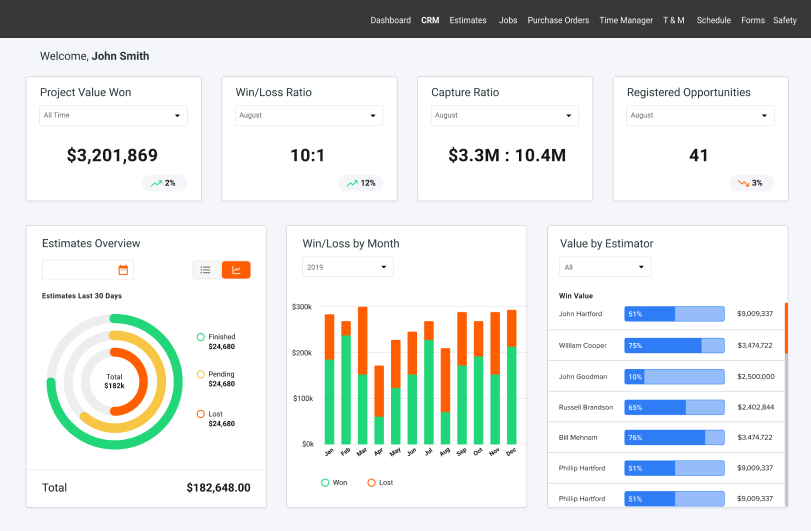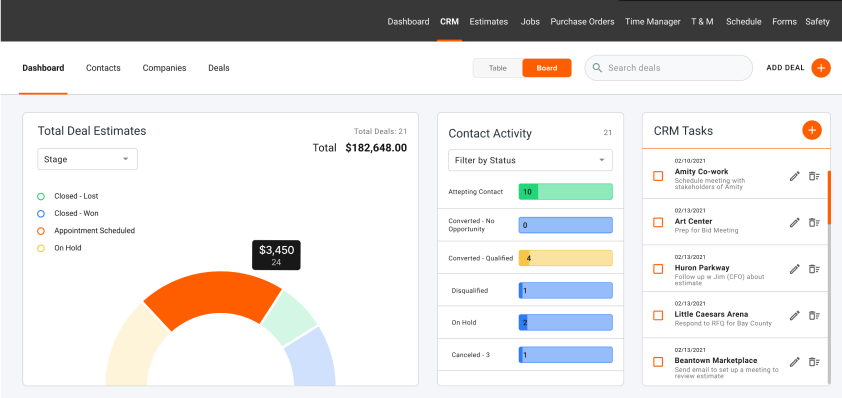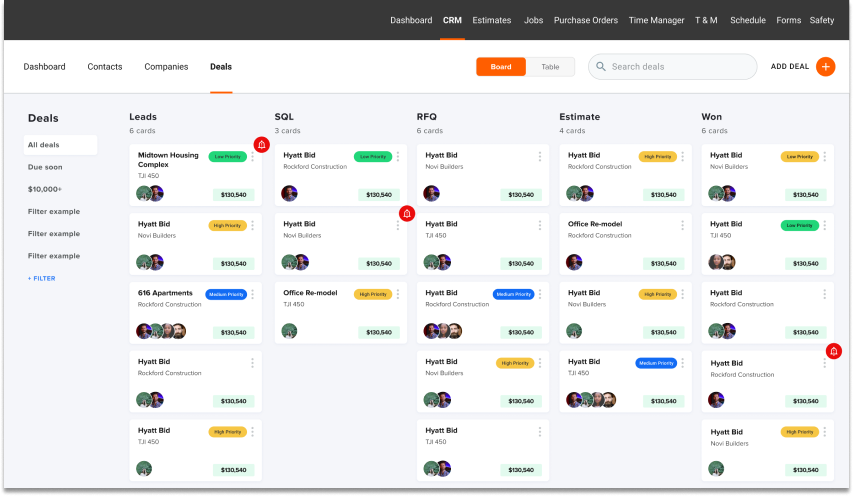A lot of contractors and managers still struggle to track and understand their sales data. It’s a constant battle of wrangling information from spreadsheets, paper forms, emails, and even word of mouth.
This current, messy way of doing business is bogging down your processes and best people. It’s difficult to track your daily sales activity, qualified opportunities, and recently won projects and dollar amounts. And, unfortunately, there’s no clear path to efficiency.
So, why are you still stuck with these methods? Because they’re familiar and what worked in the past. It’s hard to change to something new.
But the industry is now at a tipping point. Digitization is the way forward.
Adopting technology doesn’t have to be overwhelming. You can start with easy and simple tools like these below to level up your sales process, stay competitive, and win more work!
1. Make Sales Data Accessible and Accurate with a CRM
The best place to start with new business development tools is adopting a Customer Relationship Management (CRM) system. A CRM is a type of software that serves as a single location to store information about your most valuable asset, your customers. It helps you build and maintain relationships.
If you don’t have a CRM already, how are you tracking this data now? Is it in a spreadsheet, invoice, or just one of your employee’s heads?
Over time, these manual processes break down. What if that employee leaves? How long does it take for you to follow up with someone? How do you know which jobs you’re going to win next?
Fortunately, a CRM helps you store and track information to understand:
- Details and status for each job
- Deal pipeline of new opportunities
- Improvement to sales team management
- Interactions (email, phone) with customers, prospects, and partners
- Who your customers are
This software can be a game changer. It’s an easy and effective way to track progress and keep teams aligned on any communication with prospects and customers.
How do you adopt a CRM? While there are plenty of off-the-shelf tools available, you can also build your own custom CRM with a software development partner that can integrate your CRM data into other tools like dashboards and estimating software (see below).

2. Act on the Right Data with Dashboards
One of the best advantages of digitizing your data is turning it into actionable insights. Your CRM and sales data should help your team answer questions like:
- What type of projects should you pursue?
- Where do you receive new work from– how can you find more opportunities?
- What type of jobs are profitable?
And the best format to view this sales data is through dashboards, which provide an at-a-glance view for your leadership team. Through automation and logic, you can aggregate your data into a visual story that shows how your business is doing at any moment.
How so? Real-time dashboards are “always on” — collecting, organizing, and presenting the right information. You won’t be making decisions based on stagnant or missing data. You can easily spot both positive and negative trends and take action.
When building a dashboard, think about your top 5 to 10 indicators (or KPIs) that provide the right pulse on your sales performance. Then, display these KPIs on your dashboard so you can measure sales improvement over time.

3. Improve Efficiency by Connecting CRM with Estimating and Job Data
Data from your CRM can also improve other parts of your process, like building estimates. This is the trickiest part of winning more work. Estimate too high and your bid won’t win. But go too low and you put profit margins at risk.
Estimating can also be one of your most time-consuming tasks. In fact, 83% of the bid creation process involves just the paperwork and filling out forms.
So how do you speed up the estimating process? How do you create accurate numbers you’re confident in?
You can use estimating software to:
- Automate customer data from CRM and other systems like accounting
- Uses pre-built templates to create bids
- Customize materials and labor lists to build estimates specific to your company
- Project estimated costs and apply a percentage that will reach the margin you need
- Integrate with your resource planning workflows and automate takeoff
Tying your CRM and estimating tools together makes the process faster and numbers more accurate. And you’ll be able to respond to more proposals faster, which can lead to winning more work.

Where to Start with Digital Sales Tools
So, does your sales data help you win more work?
If not, that means you’re ready for change. Ditch your spreadsheets and consider new digital tools like a CRM to improve your processes. It’ll be your first step in improving your business for the better.
However, we know that a lot of construction leaders don’t know where to start with technology. With so many options out there, how do you choose?
We got you! Check out SPARK’s Construction Technology Guide and bookmark it for reference. You can also grab our free digitization checklist to use alongside it to start capturing ideas and plan for new software tools.
 About the Author: Robert Armbrister currently serves as the President and CEO of SPARK Business Works, a software development company specializing in construction software for mobile apps, dashboards and workflow tools. SPARK was recently named to the Inc 5000 fastest growing companies list and recognized as a “Top 20 Construction Technology Firms” by CIO Review for their ability to help leaders build and adopt technology.
About the Author: Robert Armbrister currently serves as the President and CEO of SPARK Business Works, a software development company specializing in construction software for mobile apps, dashboards and workflow tools. SPARK was recently named to the Inc 5000 fastest growing companies list and recognized as a “Top 20 Construction Technology Firms” by CIO Review for their ability to help leaders build and adopt technology.
Robert is also the Chief Information Officer at CSM Group, a construction management firm with projects in 20+ states. Both roles provide Robert the opportunity to see how technology, positioned between people and processes, can help firms of any size pull ahead of their competitors. Connect with Robert on LinkedIn